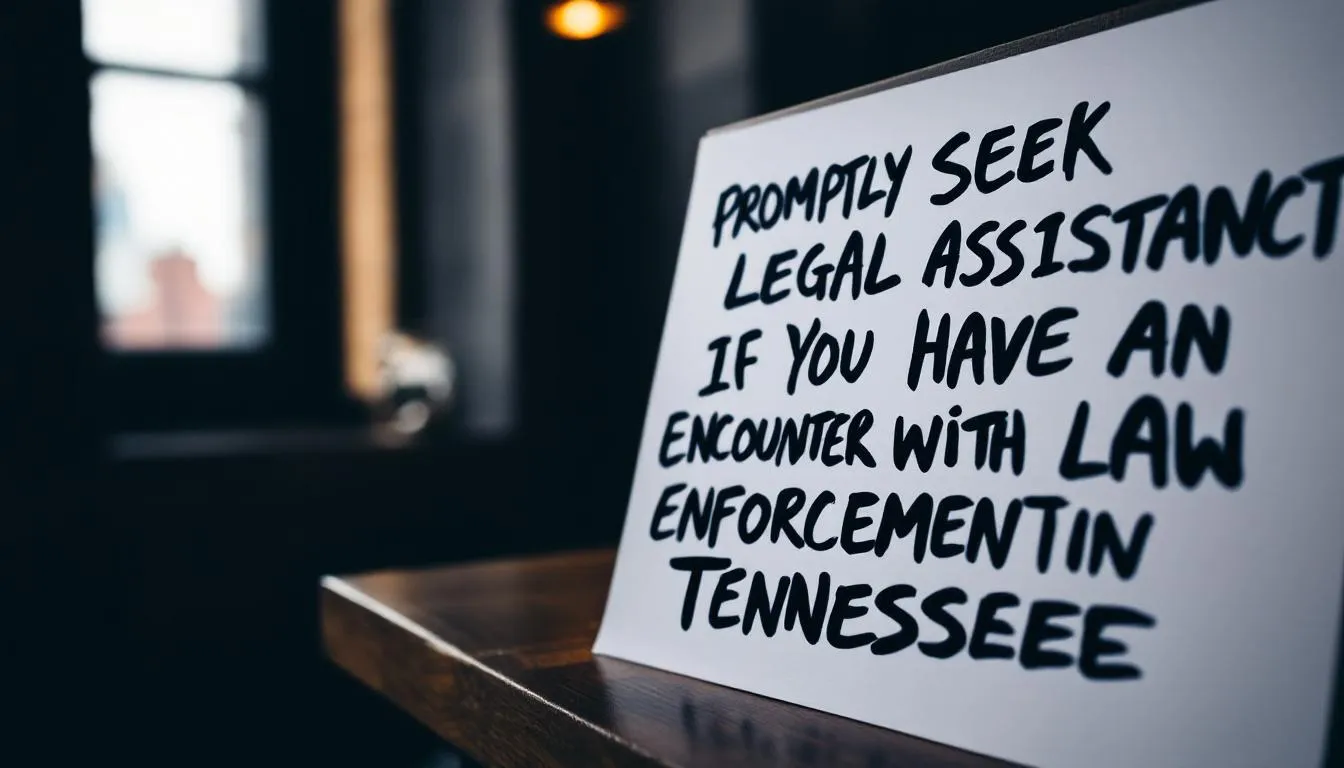Know Your Rights When Detained Tennessee: Essential Information to Protect Yourself
If you're detained in Tennessee, it's crucial to know your rights when detained Tennessee. You have the right to remain silent, the right to an attorney, and protection against unreasonable searches. This article will guide you through these rights and explain the steps to take during police encounters and detainment.
Ready to begin working with a seasoned Nashville Criminal Defense attorney? Reach out to us today at (615) 200-0449 or send us a message online to receive the support you deserve.
Key Takeaways
In Tennessee, individuals have fundamental rights during detainment, including the right to remain silent, the right to an attorney, and protection against unreasonable searches and seizures.
The detention process involves several stages, including initial encounters, custody, booking, and court appearances, during which knowing and exercising your rights is crucial.
Promptly seeking legal assistance from a qualified criminal defense attorney can significantly impact the outcome of a case, ensuring that individuals receive proper representation and guidance throughout the legal process.
Introduction to Detention Rights
Understanding your rights during interactions with law enforcement officers is essential for protecting your freedom and ensuring a fair legal process. In Tennessee, detention laws are designed to balance the responsibilities of law enforcement with the protection of your civil liberties. Whether you are stopped for questioning or facing criminal charges, knowing your rights can make a significant difference in the outcome of your case. If you find yourself in this situation, consulting a Nashville criminal defense attorney is one of the most important steps you can take. An experienced criminal defense attorney will guide you through the legal system, advocate for your best interests, and ensure that your rights are protected at every stage. Remember, when it comes to criminal defense, having a knowledgeable attorney on your side can be the key to protecting your future.
Understanding Your Rights When Detained in Tennessee

Understanding your rights when detained is vital for protecting your legal standing and ensuring fair treatment. In Tennessee, law enforcement must have reasonable suspicion or probable cause to detain you, which is a fundamental protection under the law. You are not legally required to identify yourself to police unless you are driving or are legally detained. If you are driving, you are required by law to present your driver's license to law enforcement when requested. Understanding the specific laws and procedures in Nashville and East Tennessee can significantly influence how you navigate the legal system.
When facing criminal charges, it is essential to be aware of your Miranda rights and constitutional rights. This knowledge empowers you to avoid self-incrimination and guarantees fair treatment under Tennessee law. We will explore specific rights such as the right to remain silent, the right to an attorney, and protection against unreasonable searches. Any person subject to police procedures, such as searches or requests for identification, has specific legal rights under Tennessee law.
The Right to Remain Silent
One of your most fundamental rights during a police encounter is the right to remain silent. This right shields you from self-incrimination and prevents you from inadvertently providing information that could be used against you in court. Invoke this right by calmly and politely informing the officer that you choose to remain silent.
Exercising this right is a powerful tool for safeguarding your civil liberties and protecting your legal rights.
The Right to an Attorney
Another critical right is the right to an attorney. You are entitled to legal representation during police questioning, and it is highly advisable to request an attorney before discussing any details with law enforcement. An attorney's presence protects against self-incrimination and upholds your legal rights throughout the process.
Experienced criminal defense attorneys offer essential guidance and support to navigate the complexities of criminal law and court proceedings.
Protection Against Unreasonable Searches
The Fourth Amendment protects you from unreasonable searches and seizures. Typically, law enforcement officers require a search warrant or your consent to conduct a search. However, they can perform a warrantless search if they have probable cause, meaning they have reasonable grounds to believe that evidence of a crime is present.
Grasping these protections is important, as evidence obtained from an illegal search may be excluded from proceedings, safeguarding you from unlawful government intrusion and ensuring that, as a general rule, due process is upheld and warrants are not misused, regardless of the circumstances surrounding the search.
Detention Rights and Responsibilities
Understanding your rights and responsibilities during detention is essential for protecting yourself and navigating the legal process effectively. When you are approached or detained by law enforcement officers in Tennessee, it is important to remain calm and composed. You have the right to remain silent—this means you do not have to answer questions that could lead to self-incrimination. Politely inform the officers that you wish to exercise your right to remain silent until you have an attorney present.
If you are facing criminal charges, requesting a Nashville criminal defense attorney as soon as possible can make a significant difference in the outcome of your case. An experienced criminal defense attorney will ensure your rights are protected throughout the legal process and can advise you on the best course of action. Remember, law enforcement officers must have probable cause to detain you, and understanding Tennessee law can help you recognize if your rights are being respected. If you are asked questions during detention, you are not obligated to answer without your attorney present. By knowing your rights and responsibilities, you can help safeguard your defense and ensure you are protected under the law.
Tennessee Detention Laws
Tennessee law sets clear guidelines for when a law enforcement officer can detain an individual. Police officers must have reasonable suspicion or probable cause to believe that a crime has been committed before making an arrest. During any police encounter, it is important to remain calm and understand your right to remain silent. You are not required to answer questions posed by law enforcement officers, and it is often in your best interest to calmly state that you wish to exercise your right to remain silent. This approach helps protect you from self-incrimination and ensures that your legal rights are upheld. If you are unsure how to handle a police encounter, a criminal defense attorney can offer practical tips and guidance to help you navigate the situation safely. Remember, the actions you take during these encounters can have a lasting impact on your defense and the outcome of your case.
Preparing for Detention
Preparing for detention starts with understanding your rights and the steps involved in the legal process. If you are stopped by police during a traffic stop or any police encounter, it is crucial to remain calm and composed. A criminal defense attorney can provide practical tips on how to handle these situations, such as staying polite, not volunteering information, and clearly stating your wish to remain silent.
Knowing your rights—especially the right to remain silent and the right to an attorney—can help protect you from self-incrimination and ensure you are treated fairly. Law enforcement officers must have reasonable suspicion to stop or detain you, so understanding this standard can help you assess the situation. If you are facing criminal charges, seeking legal representation from an experienced criminal defense attorney as soon as possible is vital. Early legal counsel can help you navigate the legal process, protect your rights, and work toward the best possible outcome for your defense.
What Happens During a Detention?

Detention by law enforcement can be stressful, but knowing what to expect helps navigate the process more effectively. In Tennessee, after an arrest, individuals undergo a defined process with specific rights and steps following custody. Initially, police officers will inform you of your rights and the charges against you.
We outline the stages of detention:
Initial police encounter
Custody
Booking
Bail hearing process
Understanding these stages can help you prepare for what lies ahead and ensure that you take appropriate actions to protect your rights.
Initial Encounter with Police Officers
The initial encounter with police officers is a critical moment that can set the tone for the rest of the process. In Tennessee, police officers need reasonable suspicion to initiate an encounter. This means they need a legitimate basis, such as a traffic violation or safety concern, to stop you. During a traffic stop, drivers must show their driver's license, registration, and insurance. During a routine traffic stop, passengers generally do not need to provide identification unless there is reasonable suspicion of criminal activity. Passengers must also adhere to traffic laws. Traffic stops are an important aspect of ensuring compliance with these laws.
Staying calm and cooperative during these encounters is important. If you feel your rights are being infringed, avoid arguments or resistance, as this can escalate the situation and lead to additional charges. Remember, you can leave casual interactions with police unless they have reasonable suspicion of illegal activity.
Being Taken into Custody
Once in custody, you are typically brought to a local detention center. There, you will undergo processing. This process involves being booked, where personal information is recorded for official records. During this time, immediately demand an attorney. The arrests of officers or detectives are responsible for placing you in jail and ensuring that you are processed according to legal procedures.
If you cannot visit the attorney's office, contact them for phone discussions or alternative arrangements. Having an experienced criminal defense attorney by your side can significantly impact the outcome of your case and ensure that your rights are protected throughout the legal process.
Booking and Bail Hearing
During booking, you will provide personal information such as your name, address, and date of birth. You will also undergo fingerprinting and have your photograph taken for official records. Shortly after the booking process, a bail hearing will typically occur. During this hearing, a judge will determine the conditions for your release, taking into account factors such as the severity of the charges and your criminal history.
A criminal defense attorney at your bail hearing is crucial for advocating your release and ensuring fair and reasonable conditions. Experienced criminal defense attorneys can provide valuable guidance and support during this critical stage of the legal process.
Understanding Criminal Offenses
Criminal offenses in Tennessee can range from minor traffic violations to serious felonies such as grand larceny or offenses involving controlled substances. If you are facing criminal charges, it is crucial to understand the specific nature of the alleged offense and the potential legal consequences. An experienced criminal defense attorney can help you navigate the legal process, from your initial court appearance to the final court proceeding. They can also assist in negotiating a plea agreement or seeking reduced charges, ensuring your rights are protected throughout all legal proceedings. In cases where the prosecution's case relies on evidence obtained through a warrantless search or testimony from an alleged victim, your attorney can challenge the admissibility of that evidence and work to safeguard your constitutional rights. No matter the charge, having a skilled attorney by your side is essential for building a strong defense and protecting your future.
Legal Processes Following Detention

After being detained, understanding the subsequent legal processes is vital for protecting your rights and navigating the system effectively. Promptly consulting a criminal defense attorney helps you understand your rights and navigate complex legal challenges. Post-detention legal processes significantly influence your case outcome, making it crucial to be well-informed and prepared.
We will cover key legal processes following detention, including:
Arraignment
Court appearances
Plea bargaining
Trial preparation
Each of these stages plays a critical role in determining the direction and outcome of your case.
Arraignment and Court Appearances
The arraignment is your first formal court proceeding after an arrest. During the arraignment, you will be formally charged with the alleged offense and asked to enter a plea of guilty, not guilty, or no contest. This stage is crucial as it sets the stage for the subsequent legal proceedings and often involves important decisions about bail and future court appearances.
A Nashville criminal defense attorney ensures your rights are protected and you receive optimal legal representation during this stage.
Plea Bargaining
Plea bargaining is a negotiation process between the defendant and the prosecution to resolve the case without going to trial. This plea agreement process often results in reduced charges or sentencing in exchange for a guilty plea.
In Tennessee, plea bargaining can be an effective strategy for achieving dismissals, acquittals, or reduced penalties. Experienced criminal defense attorneys seek reduced charges and offer valuable insights and negotiate on your behalf for the best possible outcome.
Preparing for Trial
Preparing for trial involves gathering relevant evidence, consulting closely with your defense attorney, and formulating a strong defense strategy. This stage includes understanding the prosecution's case and preparing to counter it effectively. Collaborating with an experienced criminal defense attorney is crucial for building a robust case and protecting your legal rights throughout the trial.
How to Handle Police Encounters Safely

Handling police encounters safely and effectively is essential for avoiding unnecessary legal trouble and protecting your rights. Knowing your rights and responsibilities during police encounters helps you stay in control and prevent escalation. Here are some important steps to follow:
Know your rights and responsibilities during police encounters.
Document what happened if your rights are violated.
Seek legal advice as soon as possible if your rights are violated.
This section provides practical tips on how to handle police encounters safely, including strategies for staying calm and composed, documenting the encounter, and knowing when to stop talking.
Staying Calm and Composed
Remaining calm during police interactions can prevent escalation and protect against additional legal issues. Remain cooperative and composed, even if you feel your rights are being infringed. Arguing or exhibiting resistance can lead to additional charges, so it is important to calmly state that you are exercising your right to remain silent.
Documenting the Encounter
Documenting details of your encounter with a law enforcement officer is crucial for future reference. Record important information such as the officer's names, badge numbers, and the time of the incident. If mistreated, note the circumstances for later reporting and seek legal advice.
Knowing When to Stop Talking
Knowing when to stop talking can make a significant difference in the outcome of your interaction with law enforcement. If you are unsure about how to respond, it is often best to remain silent to protect yourself from self-incrimination.
Invoking your right to remain silent ensures your legal rights are respected and protected during the encounter.
When to Seek Legal Assistance

Promptly seeking legal assistance after detention is crucial for protecting your rights and navigating the legal system effectively. A Nashville criminal defense attorney can provide valuable guidance and advocate for your best interests throughout the legal process. Legal representation helps you understand your rights, gather evidence, and receive courtroom advocacy to improve case outcomes.
This section emphasizes the importance of contacting a criminal defense attorney and the benefits of early legal representation.
Contacting a Criminal Defense Attorney
If you are arrested in Tennessee, it is crucial to request an attorney immediately. Reaching out to a defense lawyer immediately ensures legal protection from the start and can significantly impact your case outcome.
Experienced criminal defense attorneys can provide the necessary support and representation to navigate the legal process effectively.
Benefits of Early Legal Representation
Hiring a qualified criminal defense attorney early can significantly improve the chances of a favorable legal outcome. Early legal representation protects your constitutional rights and provides expertise in navigating the criminal justice system.
An experienced attorney helps gather evidence, formulate a strong defense strategy, and advocate for your interests throughout the proceedings with legal counsel.
Work With Ryan Terrell Law, PLLC
Ryan Terrell Law, PLLC specializes in providing legal representation for clients facing criminal charges in Tennessee. With extensive experience representing individuals charged with various offenses, the firm ensures clients receive the best defense. Located in Nashville, Tennessee, Ryan Terrell Law, PLLC is dedicated to providing superior and personalized legal service to clients throughout Tennessee.
Here, we highlight the expertise and comprehensive legal support offered by Ryan Terrell Law, PLLC and encourage readers to seek their services.
Expertise in Criminal Defense
Ryan Terrell Law, PLLC excels in navigating various criminal charges, providing strategic and aggressive criminal defense for individuals charged with:
Misdemeanors and felonies
DUI/DWI
Drug offenses
Assault and violent crimes
Domestic violence
White-collar crimes
The firm's mission is to provide aggressive, compassionate defense for every client, ensuring the best possible chance at a brighter future. With a strong local knowledge of the Nashville court system, personalized attention, and a proven track record of success, Ryan Terrell Law, PLLC stands out as a top choice for legal representation.
Comprehensive Legal Support
Ryan Terrell Law, PLLC offers comprehensive legal support to clients facing various legal challenges. The firm's 24/7 availability ensures that clients can reach out for assistance at any time, providing timely legal support during critical moments.
Free consultations are available to discuss legal issues without financial commitment, helping clients understand their cases and available legal pathways. This commitment to timely and effective legal assistance underscores the firm's dedication to achieving the best outcomes for their clients.
Contact Information
For immediate legal assistance, potential clients can reach Ryan Terrell Law, PLLC by phone at (615) 200-0449 or reach out online. The firm is also accessible through online messaging, offering a convenient way to seek legal support.
Whether you need urgent legal advice or want to schedule a consultation, Ryan Terrell Law, PLLC is ready to provide the expert representation you need. Contact them today at (615) 200-0449 or reach out online to discuss your case and explore your legal options.
Resources
If you are facing criminal charges in Tennessee, it is vital to seek legal assistance from a qualified Nashville criminal defense attorney. A reputable law office can provide the guidance and support you need to navigate the complexities of the legal system. Additionally, organizations such as the National Association of Criminal Defense Lawyers offer valuable resources and information about criminal law and defense strategies. It is also important to have a lawyer present during your initial court appearance or bail hearing to ensure your rights are protected from the very beginning. Remember, your right to remain silent is a fundamental constitutional protection—exercise it to avoid self-incrimination and to give your attorney the best opportunity to defend you effectively.
Glossary of Terms
This glossary provides definitions for key terms related to law enforcement, criminal defense, and the legal process in Tennessee:
Alleged offense: The crime or violation that a person is accused of committing, which may lead to criminal charges and legal proceedings.
Alleged victim: The individual or entity claimed to have been harmed by the alleged offense, often central to the prosecution's case.
Arrest: The act of law enforcement officers taking a person into custody based on probable cause that a crime has been committed.
Attorney present: The right to have a lawyer with you during questioning or any court proceeding to ensure your legal rights are protected.
Bail hearing: A court proceeding where a judge determines whether a defendant can be released from custody before trial and under what conditions.
Best interest: The standard by which criminal defense attorneys act to protect and represent their client's rights and interests throughout the legal process.
Civil liberties: Fundamental rights and freedoms, such as the right to remain silent and the right to legal representation, protected by the Constitution.
Controlled substances: Drugs or chemicals regulated by law due to their potential for abuse, often leading to criminal charges if possessed unlawfully.
Court appearances: Required attendances in court for legal proceedings, including arraignment, trial, or sentencing.
Court proceeding: A formal event in court, such as a hearing or trial, where evidence is presented and legal decisions are made.
Crime: An act or omission prohibited by law and punishable by the state, forming the basis for criminal charges.
Criminal activity: Actions or behaviors that violate the law and may result in arrest or prosecution.
Criminal charges: Formal accusations brought against a person, initiating the legal process and potential court proceedings.
Criminal defense: The legal strategy and representation provided by attorneys to defend individuals facing criminal charges.
Criminal defense attorney: A lawyer specializing in defending people accused of crimes, ensuring their rights are protected.
Criminal defense attorneys: Legal professionals experienced in representing clients in criminal cases and navigating the legal system.
Criminal law: The body of law dealing with crimes, penalties, and the legal process for prosecuting and defending alleged offenses.
Criminal offenses: Acts prohibited by law that can result in prosecution and punishment.
Due process: The constitutional guarantee of fair treatment through the normal judicial system, especially as a protection against arbitrary denial of legal rights.
East Tennessee: A region of Tennessee, including cities like Knoxville and Chattanooga, with its own local law enforcement and court systems.
Evidence: Information, documents, or objects presented in court to support or refute claims in a criminal case.
Evidence obtained: Material collected by law enforcement officers during an investigation, which may be used in court proceedings.
Experienced criminal defense attorneys: Lawyers with extensive knowledge and a proven track record in defending clients against criminal charges.
Facing criminal charges: The situation of being formally accused of a crime and required to defend oneself in court.
Grand jury: A group of citizens who review evidence and decide whether there is enough to indict a defendant and proceed to trial.
Grand larceny: A serious theft crime involving property of significant value, often prosecuted as a felony.
Law enforcement: Agencies and officers responsible for enforcing laws, maintaining public order, and investigating crimes.
Law enforcement officer: An individual, such as a police officer, authorized to enforce laws and ensure public safety.
Law enforcement officers: Members of agencies like the police, sheriff's department, or state patrol who enforce laws and investigate crimes.
Law office: A business or firm where attorneys provide legal services, including criminal defense and legal counsel.
Lawyer: A professional licensed to practice law, represent clients, and provide legal advice.
Legal assistance: Support and guidance provided by attorneys or law offices to help individuals navigate the legal process.
Legal counsel: Advice and representation provided by a lawyer to protect a client's legal rights.
Legal process: The series of steps and procedures followed in the court system from arrest to resolution of a case.
Legal proceedings: Formal actions taken in court, such as hearings, trials, or sentencing.
Legal representation: The act of an attorney advocating for a client's interests in legal matters and court proceedings.
Legal rights: Protections and entitlements guaranteed by law, such as the right to remain silent and the right to an attorney.
Legal system: The network of laws, courts, and institutions that administer justice and resolve disputes.
Miranda rights: The rights read to individuals upon arrest, including the right to remain silent and the right to an attorney.
New trial: A second trial ordered by a court, often due to errors or new evidence in the original case.
Officers involved: Law enforcement officers who participate in an arrest, investigation, or other police activity.
Plea agreement: A negotiated deal between the defendant and prosecution, often resulting in reduced charges or sentencing in exchange for a guilty plea.
Plea bargaining: The process of negotiating a plea agreement to resolve a criminal case without going to trial.
Police: The agency or department responsible for enforcing laws and maintaining public order.
Police encounter: Any interaction between an individual and a law enforcement officer, from a routine traffic stop to an arrest.
Police encounters: Interactions with law enforcement officers, which can range from questioning to arrest.
Police officer: An individual employed by a police department to enforce laws and protect the public.
Police officers: Members of law enforcement agencies who carry out policing duties.
Probable cause: The legal standard requiring reasonable grounds for law enforcement officers to make an arrest or conduct a search.
Protect: To defend or safeguard an individual's legal rights or interests.
Protecting: The act of ensuring someone's rights or interests are defended.
Protected: The state of having one's rights or interests defended by law or legal representation.
Prosecution's case: The evidence and arguments presented by the state to prove the defendant's guilt in court.
Questioning: The process of law enforcement officers asking questions to gather information or evidence.
Questions posed: The specific inquiries made by police officers during an investigation or legal proceeding.
Reasonable suspicion: The standard that allows law enforcement officers to stop or detain someone if they have specific, articulable facts suggesting criminal activity.
Right to remain silent: The constitutional right to refuse to answer questions or provide information to law enforcement officers.
Routine traffic stop: A common police encounter initiated for a traffic violation, such as speeding or a broken taillight.
Seek justice: The pursuit of fairness and legal resolution through the court system.
Seek reduced charges: The effort to negotiate for lesser charges or penalties in a criminal case.
Self-incrimination: Providing information or answers that could be used as evidence against oneself in a criminal case.
Significant difference: A notable impact, often referring to the effect of legal representation or defense strategy on a case outcome.
Stop talking: The act of refusing to answer further questions, often to avoid self-incrimination.
Tennessee law: The statutes and regulations specific to the state of Tennessee, governing criminal and civil matters.
Traffic laws: Rules and regulations that govern the operation of vehicles on public roads.
Traffic stop: An interaction initiated by a law enforcement officer with a driver, usually due to a suspected traffic violation.
Traffic stops: Instances where law enforcement officers pull over drivers for suspected violations of traffic laws.
Traffic violation: An infraction of traffic laws, such as speeding, running a red light, or not wearing a seatbelt.
Warrant: A legal document issued by a court authorizing law enforcement officers to make an arrest or conduct a search.
Warrantless search: A search conducted by law enforcement officers without a warrant, typically justified by probable cause or exigent circumstances.
This glossary is designed to help you better understand the terminology used in law enforcement, criminal defense, and the legal process in Tennessee.
Next Steps
If you have been arrested or are facing criminal charges in Tennessee, taking immediate action is crucial to protect your rights. First, remain calm and do not answer any questions posed by law enforcement officers without an attorney present. Second, seek legal assistance from an experienced Nashville criminal defense attorney who can guide you through the legal process and advocate for your best interests. Third, make sure you understand your rights and the circumstances surrounding your arrest, including any evidence obtained by law enforcement officers. By following these steps, you can ensure that your rights are protected and that you receive the strongest possible defense. Remember, the guidance of a skilled attorney can make a significant difference in the outcome of your case, so do not hesitate to seek their help as soon as possible.
Summary
In summary, knowing your rights when detained in Tennessee is crucial for protecting yourself and navigating the legal system effectively. From the right to remain silent and the right to an attorney to protection against unreasonable searches, being informed about your legal rights can significantly impact the outcome of your case. Understanding the detention process, including the initial encounter with police officers, being taken into custody, and the booking and bail hearing, helps you prepare for what lies ahead.
The legal processes that follow detention, such as arraignment, plea bargaining, and preparing for trial, require careful navigation and the expertise of a criminal defense attorney. Handling police encounters safely by staying calm, documenting the encounter, and knowing when to stop talking can prevent unnecessary legal trouble. Seeking early legal assistance from experienced criminal defense attorneys, such as those at Ryan Terrell Law, PLLC, ensures that your rights are protected and that you receive the best possible defense. Contact Ryan Terrell Law, PLLC at (615) 200-0449 or reach out online for expert legal support and representation.
Frequently Asked Questions
What should I do if I am detained by police in Tennessee?
If you are detained by police in Tennessee, remain calm, exercise your right to remain silent, and request an attorney immediately. This approach will help protect your rights during the process.
When can police conduct a search without a warrant?
Police can conduct a search without a warrant when they have probable cause to believe evidence of a crime is present. This exception allows for immediate action in circumstances where obtaining a warrant is impractical.
What happens during an arraignment?
During an arraignment, you are formally charged with the alleged offense and asked to enter a plea of guilty, not guilty, or no contest. This is a critical step in the legal process where your response will shape the next stages of your case.
How can early legal representation benefit my case?
Early legal representation is crucial as it safeguards your constitutional rights and leverages expertise in the criminal justice system, greatly enhancing the likelihood of a favorable legal outcome.
How can I contact Ryan Terrell Law, PLLC for legal assistance?
To contact Ryan Terrell Law, PLLC for legal assistance, please call (615) 200-0449 or contact them online for prompt support.